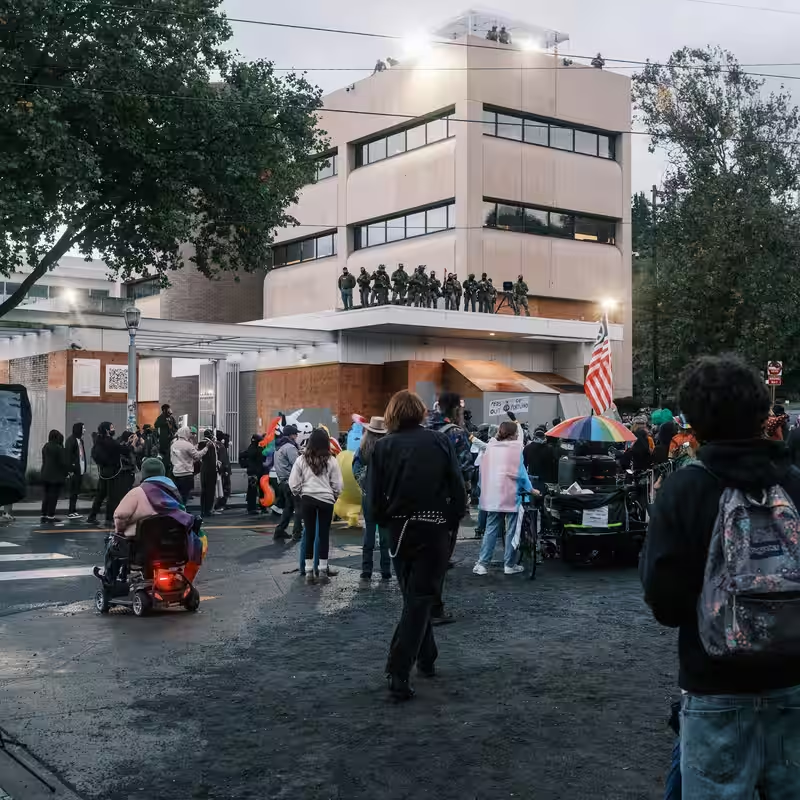In a sharply divided legal decision, a federal appeals court has temporarily allowed former President Donald J. Trump to deploy National Guard troops to Portland, Oregon—a move that reignites debate over federal authority, civil unrest, and executive power.
The U.S. Court of Appeals for the Ninth Circuit issued a preliminary ruling on Monday, October 20, 2025, lifting a lower court’s injunction that had blocked the deployment. While the decision is not final, it clears the way—for now—for troops to be stationed in the city amid ongoing protests and political tension.
What the Ruling Actually Says
The three-judge panel did not rule on the constitutionality of the deployment itself. Instead, it determined that the plaintiffs—led by Oregon state officials—had not yet met the high legal bar required to halt the action while the case proceeds through the courts.
“At this preliminary stage, the balance of equities and public interest do not clearly favor enjoining the deployment,” wrote Judge Milan D. Smith Jr., a George W. Bush appointee, in the majority opinion.
One judge dissented, warning that the move could set a dangerous precedent for federal overreach into state affairs.
Why Portland?
Portland has been a flashpoint for political demonstrations since 2020, with frequent clashes between protesters, local law enforcement, and, at times, federal agents. Trump’s administration previously sent federal officers to the city during his presidency, drawing widespread criticism from civil liberties groups and Oregon’s Democratic leadership.
This latest effort appears to be part of a broader strategy by Trump allies to assert federal presence in cities perceived as hubs of unrest—despite local officials’ objections.
Timeline of the Legal Battle
| Date | Event |
|---|---|
| Oct. 12, 2025 | Trump announces intent to deploy National Guard to Portland |
| Oct. 14, 2025 | Oregon Attorney General files lawsuit to block deployment |
| Oct. 16, 2025 | Federal district court issues temporary injunction |
| Oct. 20, 2025 | Ninth Circuit lifts injunction in preliminary ruling |
What Happens Next?
Legal experts say the case is far from over. The Ninth Circuit’s decision is limited to the preliminary phase, and a full trial on the merits could take months—or even years. In the meantime, National Guard units could begin arriving in Portland as early as this week, though the Department of Defense has not confirmed specific timelines.
Oregon Governor Tina Kotek called the ruling “deeply troubling” and vowed to continue fighting in court. “Portland does not need outside forces escalating tensions,” she said in a statement. “We have capable local law enforcement and a right to govern our own communities.”
Broader Implications for Federalism
The case touches on core constitutional questions: Can a former president—acting through current executive channels—deploy military-style forces into a state against its governor’s wishes? Legal scholars are split, but many warn that normalizing such actions could erode state sovereignty.
“This isn’t just about Portland,” said constitutional law professor Elena Ruiz of Lewis & Clark Law School. “It’s about who controls public safety in America—local communities or Washington power brokers.”
Public Reaction and Political Fallout
Reactions have fallen along predictable partisan lines. Conservative commentators praised the court’s decision as a win for “law and order,” while progressive groups organized emergency rallies in downtown Portland, fearing militarized escalation.
Meanwhile, the Biden administration has remained largely silent, with White House Press Secretary declining to comment on an “ongoing judicial matter.”




